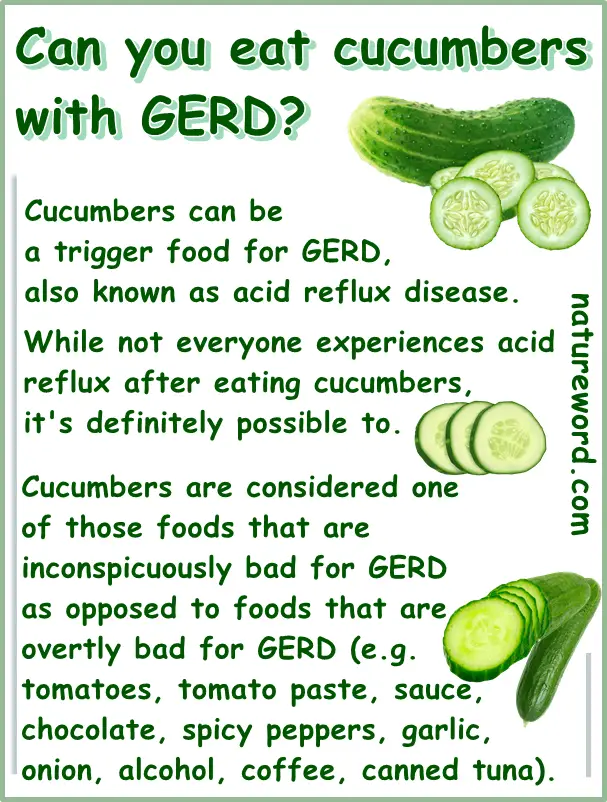Cucumbers are in full season right now and a favorite summer vegetable that easily finds its way on many plates. But how safe is cucumber to eat if you have stomach problems? Can cucumber cause stomach upset? Does eating cucumber trigger acid reflux? What are the effects of eating cucumber with GERD? Is cucumber a safe food to eat with GERD or best avoided?
What is acid reflux?
Acid reflux is the main symptom of acid reflux disease, more formally known as gastroesophageal reflux disease or GERD. Acid reflux is essentially the backflow of gastric juices and sometimes also partially digested food. In severe forms, stomach contents with gastric juices can come back as high up as the back of the throat and cause regurgitation and a bad, usually acidic, but also sour or metallic taste in the mouth.

Gastric juice is naturally corrosive which means that, with sufficient exposure, it can erode mucous membranes. So as gastric juices escape the stomach and raise up into the esophagus, chest pain or a burning sensation in the chest, better known as heartburn, is felt.
Heartburn is the principal and most noticeable of all acid reflux symptoms. Over time, repeated episodes of acid reflux cause irreparable damage to the mucous membranes they come into contact with and increase risks of disease such as esophageal cancer.
Acid reflux and diet
To get rid of acid reflux for good, dietary changes are vital as acid reflux is both caused and worsened by what you eat. Often times, an acid reflux diet is a diet for life as in you have to keep up a predominantly acid reflux-friendly eating regimen, although after sufficient time eating the right foods, slips become quite well tolerated and do not compromise results.
There are two main types of foods that are bad for GERD. One type is foods that are overtly bad for the condition and almost always trigger acid reflux and associated symptoms: cocoa and chocolate, tomato paste and concentrate, tomato juice and sauce, garlic, onions, hot peppers and spicy paprika, fried foods, foods high in fat, highly processed foods high in preservatives, coffee, alcohol.
The second type of foods to avoid with GERD includes foods that are inconspicuously harmful, that is, foods that are healthy and apparently not bad to eat with the condition, but which do in fact trigger symptoms, just to a lesser degree or only if consumed above a certain amount or with a certain frequency. But because they taste in such a way that they do not appear problematic, they are overlooked and, even worse, actively included in what is supposed to be an acid reflux diet.

These include foods such as:
- healthy oily fish (e.g. salmon, tuna)
- canned foodstuff (e.g. canned tuna, canned tomatoes)
- fruit and vegetable juices in general, but more so juice made from problematic trigger foods (e.g. orange juice, tomato juice, lemon juice, lime juice, but also apple juice, cherry juice, pineapple juice)
- spices (e.g. ginger which is actively promoted as a good remedy for stomach upset, irrespective of underlying causes)
- otherwise healthy fresh foods, both fruits and vegetables: e.g. cucumber, pineapple, papaya, bananas and fresh tomatoes. Also see about tomatoes and acid reflux and heartburn.
- foods such as pork or liver. Also see about the effects of eating liver with GERD.
See what other foods to avoid if you have acid reflux.
Is cucumber bad for acid reflux?
Is cucumber bad for acid reflux? For some people, yes. For some people, no. As mentioned above, cucumber is one of those foods that can be bad for acid reflux, but isn’t always so or as bad as other foods. It depends on the person, on the severity of their condition, their intake of said food and frequency of intake, and how well managed their condition is at the time of consumption.
Can you eat cucumber if you have acid reflux?
Answer: you can, but you may or may not experience reflux afterwards.
To tell if you personally can eat cucumber if you have acid reflux disease, look out for symptoms such as: regurgitation of stomach juices, associated heartburn or chest pain, a bad taste in the mouth that can be acidic, sour or metallic, excessive burping and burps with a cucumber flavor, bloating and gas, indigestion and stomach pain.
If you do experience one or more of these symptoms, then it’s not a good food for you. But if you don’t, then it might just be a food you tolerate. Just as important, if you experience a general feeling of malaise and digestive upset following consumption, but not typical symptoms, and cannot trace anything back to other trigger foods, then it’s possible cucumbers are what is causing acid reflux for you, but it’s asymptomatic.
Tip: Do consider other aspects such as amount and frequency of intake, your diet as a whole, and test to find the right balance for you.
Also read about eating fresh apricots with GERD and the effects of dried apricots on acid reflux.
Should you eat cucumber if you have acid reflux?
Answer: it depends. If cucumber doesn’t elicit any symptoms, it’s probably ok to eat in reasonable amounts. But if it causes straight up reflux with regurgitation of stomach juices and/or other stomach contents such as partially digested food or food particles, heartburn, excessive burping and more side effects, then it’s quite clear it’s a food you are better off avoiding altogether.
Just as important, a lot of people have what is known as ‘silent’ acid reflux and do not experience typical GERD symptoms – because of this, they may not realize they have acid reflux at all. A typical acid reflux symptoms include coughing, hoarseness, laryngospasms, nausea, vomiting and a general feeling of malaise or a generalized digestive upset that is hard to pinpoint.
Also, some people have had acid reflux for so long that they’ve gotten used to it and have come associate it with normal everyday life. In this case it’s understandable they are unable to conceive how downright healthy foods such as tomatoes, cucumbers, garlic, bananas, cherries, pineapple, broccoli and more can be bad for you.
Also see what are the effects of cherries in acid reflux.
Is cucumber good for acid reflux?
When it comes to any food and its effects on acid reflux, there’ll always people who will not admit that it is possible for others to simply not respond well to foods they tolerate. Even worse, there are those that will fixate on a food they tolerate, or think they do, and embark on a personal quest of rebutting any and all other experiences, reports and even documented evidence that says otherwise.
The same is true for cucumbers: while not the absolute worst food for GERD, cucumbers are known to cause acid reflux and excessive burping and upset the stomach, although it doesn’t happen with the same frequency or at the same level as with other foods that are straight up bad for GERD such as tomato paste, canned tuna, lemon juice or acidic cheeses. That’s why we say that cucumbers are one of those foods that are inconspicuously bad for GERD.
But what’s worse is there will be voices that will claim that cucumbers are not just not bad for GERD, but that they are safe to eat with the condition and even good for it. While some foods are indeed relatively well tolerated in GERD, no food is truly good for the condition as in it produces actual benefits for it and actively contributes to curing it. There’s no such food.
At most, foods that are good for GERD do not trigger symptoms – that’s about the most benefit you can derive from foods classified as good for the digestive condition. So no, cucumber is not good for GERD and filling up on cucumber salad or other things cucumber will not help
Conclusion
It’s true that not everyone with acid reflux finds cucumbers a trigger food. If consumed reasonably, as part of an overall balanced diet that is acid reflux-friendly, cucumbers can be well tolerated. Both the food itself and how it is incorporated in one’s diet make a big difference in whether or not flareups ensue.
If you however experience some degree of stomach upset after eating cucumbers, whether typical symptoms such as regurgitation and heartburn, excessive burping or acid reflux at night, or atypical symptoms such as coughing, hoarseness, laryngospasms or a general feeling of malaise and digestive upset, but cannot trace anything back to other trigger foods, then it’s possible it’s the cucumbers and you need to eliminate them from your diet, if not indefinitely, then at least for a healthy while while you get your condition under control.
